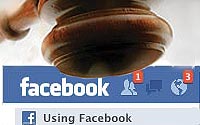Facebook To Give Users More Control Over 'Sponsored Stories'
- by Wendy Davis @wendyndavis, June 18, 2012

Facebook has agreed to give users more control over how their names appear in sponsored stories in order to settle a class-action lawsuit. The company also agreed to pay $10 million to various public interest organizations, according to court documents that were filed late last week.
If approved, the proposed settlement would resolve one of two cases against Facebook stemming from the sponsored stories program, which publicizes users' "likes" to their friends. Facebook notified U.S. District Court Judge Lucy Koh last month that it had resolved the lawsuit, but details about the settlement weren't publicly available until the weekend.
Koh will hold a hearing in July about whether to grant the settlement preliminary approval.
The litigation dates to last April, when a group of users sued Facebook for allegedly violating a California law that gives people the right to control the commercial use of their names and images. That statute provides for at least $750 in damages per violation.
But the proposed settlement doesn't call for Facebook's members to receive any money in damages. Instead, the bulk of the $10 million provided for in the settlement fund will go to "groups whose charters set out actions and programs relevant to advocacy related to the purposes for which the case was brought," according to court documents.
Presumably, the lawyers who brought the case also will receive attorneys' fees.
The tentative settlement also requires Facebook to provide "additional notice" to users about "exactly what occurs when they take certain actions," according to a declaration filed with the court by Edward Infante, a former federal magistrate judge who mediated the deal.
He adds that Facebook also agreed to an injunction that "includes engineering additional controls to enable users to prevent specific actions from appearing in sponsored stories."
A Facebook spokesperson declined to elaborate on how the company intends to change the user controls in this area.
The sponsored stories case that was settled was brought by consumers including Angel Fraley, Paul Wang and Susan Mainzer; Fraley and Wang later asked to withdraw from the case, but their names are still included in the case's title.
Last December, Koh rejected Facebook's bid to dismiss the case at an early stage. Facebook argued that users consented to the sponsored stories program when they signed up for the site. The ad program is mentioned in the terms of service. But the users countered that they joined Facebook before it launched sponsored stories.
Facebook also unsuccessfully argued that the case should be dismissed because the users hadn't been harmed financially by the program. A separate but related lawsuit against Facebook for allegedly violating California law by including minors in the sponsored stories program is still pending before Koh. That lawsuit alleges that Facebook violates a California law banning companies from using minors' names or images in ads without their parents' permission.
Other Web companies, including Netflix and Google, also have recently agreed to settle privacy lawsuits by promising to donate money to public interest groups. But courts are increasingly scrutinizing settlements that don't provide for damages to class members.
The 9th Circuit Court of Appeals (which encompasses California, where the case against Facebook was brought) rejected a proposed class-action settlement involving Motorola. Consumers in that lawsuit alleged that Motorola didn't disclose the risk of hearing loss posed by Bluetooth headsets.
The proposed settlement required Motorola to donate $100,000 to various health-related organizations, while the attorneys who sued would have received $800,000. That same court is still considering whether to uphold Facebook's Beacon settlement, which calls for the company to pay more than $6 million to launch a new privacy foundation, and for the lawyers who brought suit to split around $2.3 million. That deal doesn't provide for monetary damages to the users (except for the 19 who were named in the complaint).


